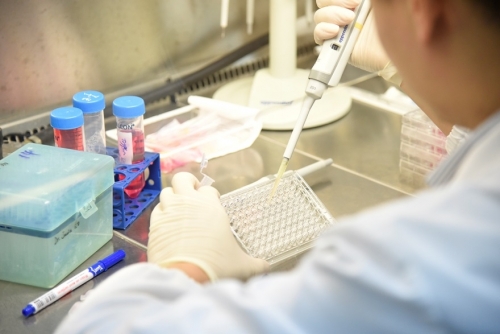Recently, the world’s first referenceable catalogue of gut microbial genes in Sprague-Dawley (SD) rats was completed, and the relevant latest research findings were published online on world famous journal, GigaScience, under the Oxford Academic publication group. The research project was directed by Chair Professor Liu Liang, Director of State Key Laboratory of Quality Research in Chinese Medicines (Macau University of Science and Technology), and jointly completed by the Gene Research Institute of Shenzhen Huada Life Science Academy and the Shenzhen China National Genebank.

The Sprague-Dawley (SD) rats are important laboratory animals, which are widely used in development of animal models for biomedical studies in relation to human physiological or pathogenic processes, including rheumatoid diseases such as rheumatoid arthritis. In order to uncover the potential correlation of gut microbiota in the occurrence of rheumatoid arthritis, and illuminate the dynamic impact of drug intervention on gut microbiota and experimental arthritis, the research team established gene catalog that comprises 5,130,167 non-redundant gene sets, which are about 200 times of the genes of SD rats themselves, approximating saturation. Among the genes, 64.6% were annotated to phylum levels, which mostly belong to Firmicutes (75.90%), Bacteroidetes (10.83%) and Proteobacteria (6.77%); 26.7% were annotated to genus levels, which mainly belong to Clostridium (8.74%), Bacteroides (6.25%), Roseburia (4.75%), Ruminococcus (4.44%), and Lachnoclostridium (2.58%). Functionally, 53.1% of the genes could be annotated to Kyoto Encyclopedia of Genes and Genomes (KEGG). A comparison of rat gut metagenome catalogue with human or mouse revealed a higher pairwise overlap between rats and humans than between mice and humans either at the gene level or at the functional level. This therefore underscores the potential use of the SD rats as ideal animals for making animal models that study the correlation of human diseases and gut microbiome.
The successful establishment of the catalogue of the SD rat gut metagenome has been a significant breakthrough in research on gut microbiota and diseases. The use of the SD rats in development of animal models, which study the gut microbiota of human diseases, may bring to greater light the internal connections between the occurrence and progression of complex diseases and the gut microbiota and may also provide a new technique platform for research and development of novel drugs. Chair Professor Liu Liang, who is director of the research team, says, “We’re now building on the gene catalogue and applying Chinese and western medicines, probiotics and other intervention means to manipulate the gut microbiota so as to further elucidate the cause-effect correlation between microbiota changes and prognosis of diseases and eventually develop new strategies and novel drugs for treatment of rheumatoid diseases such as rheumatoid arthritis.”
The paper:A gene catalogue of the Sprague-Dawley rat gut metagenome(GigaScience, Volume 7, Issue 5, 1 May 2018, giy055)






